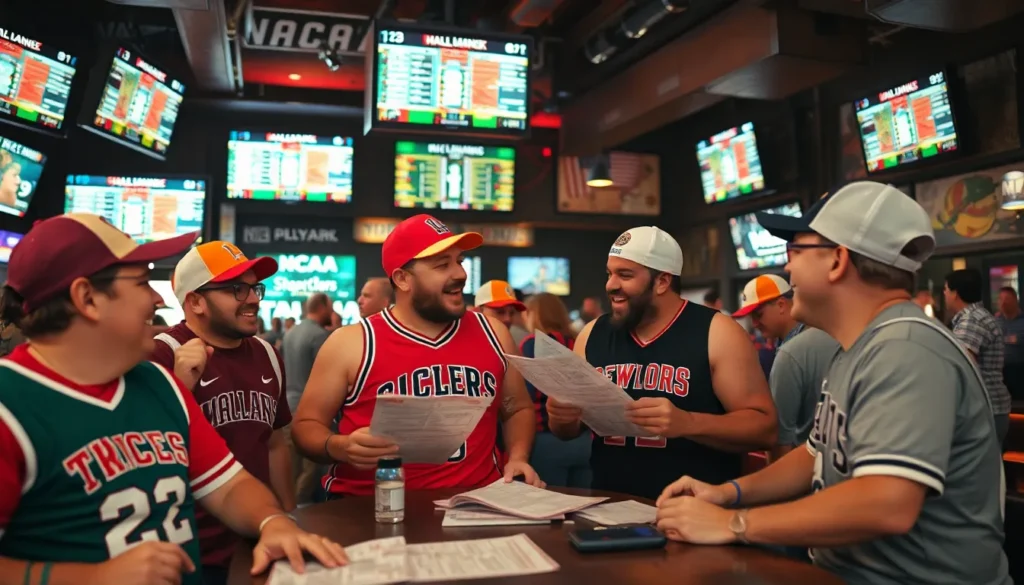March Madness brings out the inner sports fanatic in everyone. Fans fill out brackets with dreams of glory, hoping to predict every game correctly. But let’s face it—achieving a perfect bracket is like finding a unicorn at a basketball game. It’s a rare phenomenon that’s sparked countless debates and endless theories.
Table of Contents
ToggleThe Quest for a Perfect Bracket
The pursuit of a perfect bracket captivates millions each year during March Madness. Fans embrace this challenge, fueled by the thrill of competition and the hope of predicting every game outcome accurately. Despite the excitement, achieving a flawless bracket remains an elusive goal. Statistics reveal that the odds of completing a perfect bracket are approximately 1 in 9.2 quintillion, illustrating the daunting nature of this task.
Experts suggest that randomness plays a significant role in the tournament. Every year, unexpected upsets and surprises alter the expected outcomes, complicating predictions. The rigorous nature of elimination rounds further complicates the quest, as teams can perform well in one game and falter in the next.
Many sports enthusiasts share stories of near misses. Some recount brackets that were almost perfect, only to be shattered by shocking results. These near perfect examples spark debates on strategies and theories, as fans analyze mistakes and seek a formula for success.
Numerous contests offer cash prizes for achieving a perfect bracket, heightening the interest. Participants say they enter these competitions, turning the pursuit into a thrilling gamble. Social media buzzes each tournament, with fans sharing tips, advice, and strategies, hoping to improve their chances.
Ultimately, the search for a perfect bracket serves to enhance the excitement surrounding March Madness. This fervor captures the spirit of the tournament, making every game an opportunity for fans to engage with their favorite teams and players.
Historical Background

Bracket prediction has captivated sports fans since the inception of the NCAA tournament. It started as a simple way for fans to engage with the games and has grown into a national phenomenon.
The Origins of Bracket Prediction
Bracket prediction traces back to the early years of the NCAA tournament. Fans created informal contests among friends to guess game outcomes. Institutionalization came in the 1980s as companies began offering prizes for correctly filled brackets. The appeal lay in the chance to showcase sports knowledge, making it a social event. Predictive strategies emerged as fans analyzed team statistics, player performance, and coaching styles. The combination of competitiveness and chance added to the thrill, solidifying brackets as a staple during March Madness.
Evolution of March Madness
March Madness evolved into a major sports event since its inception in 1939. Initial tournaments featured only eight teams, expanding to 68 teams by 2011. The growth attracted unprecedented attention and participation from fans across the nation. Television broadcasts began in the 1980s, boosting visibility and audience engagement. Over the years, various platforms emerged for fans to create and share brackets. Electronic submission made participation accessible, resulting in millions joining the excitement annually. The combination of tradition, spectacle, and unpredictability keeps the tournament relevant and thrilling.
Notable Attempts
The quest for a perfect bracket has led to several remarkable attempts throughout the history of March Madness. Fans continually push boundaries, aiming for that elusive goal.
Famous Near-Perfect Brackets
One standout example occurred in 2019 when a fan named Greg Nigl achieved 49 out of 50 correct picks in the first two rounds. His achievement marked one of the best bracket performances on record. Another notable attempt happened in 2017 when a contestant named “Dancin’ with the Stars” secured a nearly flawless bracket with 47 correct predictions. These near-perfect brackets spark conversations about potential strategies and luck in the unpredictable tournament.
Technological Advances in Predictions
Advancements in technology now play a crucial role in bracket predictions. Algorithms analyze game statistics, player performance, and historical data, providing fans with tools for better-informed choices. Websites and apps, such as ESPN and Yahoo Fantasy Sports, offer tools and analytics, allowing participants to make data-driven decisions. Enhanced machine learning models contribute insights about team matchups, boosting the accuracy of predictions. As technology continues to evolve, it enriches the bracket-making experience for millions.
Statistical Probability
Predicting a perfect bracket remains one of the greatest challenges in sports fandom. The probabilities illustrate just how elusive this goal is.
The Odds of a Perfect Bracket
The odds of completing a perfect bracket are approximately 1 in 9.2 quintillion. Each of the 63 games during the NCAA tournament can end in two ways, leading to astronomical possibilities. For example, even if a participant randomly guesses, the likelihood of achieving a flawless outcome is astronomically low. Variations in seeding and team performance add complexity, significantly lowering chances of success. Those who enter bracket contests face a nearly insurmountable challenge.
Factors Influencing Success
Various factors influence the success rate of bracket predictions. Team performance during the season plays a critical role. Injuries can turn the tide unexpectedly, affecting outcomes of games. Additionally, fan biases introduce unpredictability into their choices. Historical matchups matter too, as they provide context that helps refine predictions. Many also rely on data analysis, utilizing statistical algorithms and expert insights to inform their decisions. Ultimately, these elements combined highlight the unpredictable nature of March Madness.
The quest for a perfect bracket remains a captivating challenge for sports fans every March Madness. Despite the overwhelming odds stacked against them achieving a flawless prediction is a thrilling endeavor that fuels excitement and engagement. The stories of near misses and remarkable attempts only add to the allure of this annual tradition.
As technology continues to evolve providing fans with advanced tools and insights the pursuit of perfection may become slightly more attainable. However the unpredictability of the tournament ensures that the dream of a perfect bracket will always be just out of reach. This ongoing chase not only enhances the experience of March Madness but also unites fans in their shared passion for the game.








